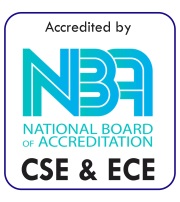- About ECE Department
- Vision & Mission
- Course Outcomes
- PEO'S, PO'S, PSO'S
- HOD
- Faculty
- Supporting Staff
- LABS
- Student Counselors
- Research
- Time Table
- Department Academic Calendar
- Department Achievements
- Events
- EDC Activities
- News Letters
- ECE Syllabus
- Faculty Participation
- Faculty Publications
- Faculty Patents
- Conferences and Book Chapters
- Innovations in Teaching Process
- Professional Societies/Bodies
- Commercial Products
ELECTRONICS AND COMMUNICATION ENGINEERING
PEO1: To develop the students ability on technical concepts to design, simulate, and synthesize various electronic and communication circuits & systems for their research advancements.
PEO2: To impart analytical skills and to prepare the students excel in applying state of the art hardware and software tools to solve complex engineering problems for R&D, Industry and societal requirements.
PEO3: To prepare students to work in teams, take independent decisions and integrate engineering issues for successful career in multi-disciplinary environment.
PEO4: To promote entrepreneurship among the students to become successful entrepreneurs with professional ethics.
Program Specific Outcomes :
PSO1: Professional Skills Ability:Identify, design electronics & communication circuits and conduct experiments with electronics & communication systems, analyze and interpret data, formulate and solve electronics & communication engineering problems.
PSO2: Industrial Skills Ability: Design digital and analog systems, algorithms, firm ware, modern engineering tools, software, etc. as per needs and specifications and work in laboratory and multidisciplinary tasks.
PSO3: Ethical and Social Responsibility: Communicate effectively in both verbal and written form, will have knowledge of professional and ethical responsibilities and will show the understanding of impact of engineering solutions on the society and also will be aware of contemporary issues
Program Outcomes :
PO1: Engineering knowledge : Apply the knowledge of mathematics, science, engineering fundamentals, and an engineering specialization to the solution of complex engineering problems
PO2: Problem analysis : Identify, formulate review research literature and analyze complex engineering problems reaching substantiated conclusions using first principle of mathematics, natural science and engineering science
PO3: Design/development of solutions : Design solutions for complex engineering problems and design system components or processes that meet the specified needs with appropriate consideration for the public health and safety, and the cultural, societal, and environmental considerations
PO4: Conduct investigations of complex problems : Use research-based knowledge and research methods including design of experiments, analysis and interpretation of data, and synthesis of the information to provide valid conclusions
PO5: Modern tool usage : Create, select, and apply appropriate techniques, resources, and modern engineering and IT tools including prediction and modeling to complex engineering activities with an understanding of the limitations
PO6: The engineer and society : Apply reasoning informed by the contextual knowledge to assess societal, health, safety, legal and cultural issues and the consequent responsibilities relevant to the professional engineering practice
PO7: Environment and sustainability : Understand the impact of the professional engineering solutions in societal and environmental contexts, and demonstrate the knowledge of, and need for sustainable development
PO8: Ethics : Apply ethical principles and commit to professional ethics and responsibilities and norms of the engineering practice
PO9: Individual and team work : Function effectively as an individual, and as a member or leader in diverse teams, and in multidisciplinary settings
PO10: Communication : Communicate effectively on complex engineering activities with the engineering community and with society at large, such as, being able to comprehend and write effective reports and design documentation, make effective presentations, and give and receive clear instructions
PO11: Project management and finance : Demonstrate knowledge and understanding of the engineering and management principles and apply these to one's own work, as a member and leader in a team, to manage projects and in multidisciplinary environments
PO12: Life-long learning : Recognize the need for, and have the preparation and ability to engage in independent and life-long learning in the broadest context of technological change




